» Go to news main
Dal builds momentum in Nova Scotia’s growing ocean‑tech sector with new role
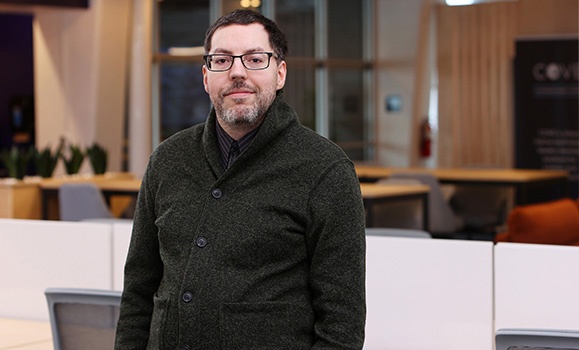
For the coastal city of Halifax, Nova Scotia, there has long been a strong connection between the ocean and cutting-edge research initiatives. Growth in the ocean-tech sector in recent years has enabled even more of this kind of collaboration as organizations seek to address pressing issues such climate change, marine conservation, and sustainable resource management.
As the sector continues to advance, so do several Halifax-based organizations fuelling its growth such as COVE and DeepSense.
A new position created by Dal's Faculty of Computer Science aims to build further alignment in these organizations’ shared ambitions, develop stronger industry partnerships, and propel the ocean-tech economy forward.
Dr. Chris Whidden has been named the inaugural DeepSense COVE Digital Ocean Research Chair. An original member of DeepSense and a PhD graduate in Computer Science, Dr. Whidden was a natural fit for the role.
“It was really exciting and a moment of great pride for me,” says Dr. Whidden of securing the role. “This position is a formalization of a lot of work that has been going on with DeepSense over the last five years and I’m looking forward to what the years to come will bring.”
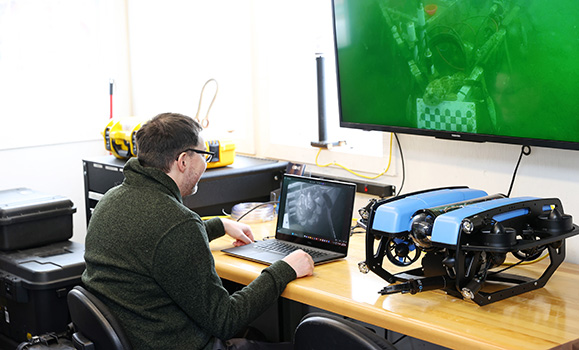
Dr. Whidden will seek to push for further advancements in how Artifical Intelligence, or AI, is used in the in the ocean sector.
A bridge between academia and industry
Lucija Prelovec, Executive Director (Acting) for DeepSense, echoes Dr. Whidden’s excitement.
“One of the initial main goals of DeepSense was to bridge the gap between academia and industry,” explains Prelovec. “Having a dedicated researcher in that position will really help strengthen the bridge that we're building.”
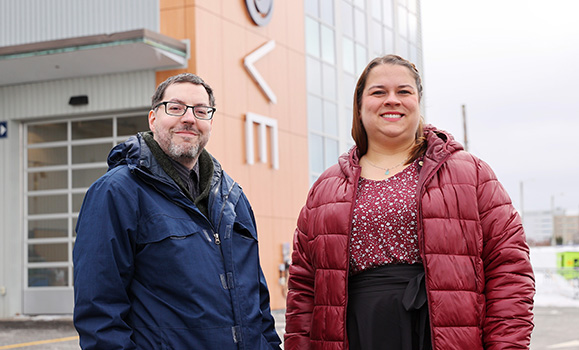
Dr. Whidden, left, with DeepSense's Lucija Prelovec.
The new role reflects the deepening partnership between DeepSense, COVE and the Faculty of Computer Science. Each partner offers its own value to the sector. COVE serves as a high-tech innovationhub bringing marine technology organizations, academia and government together. Similarly, DeepSense aims to grow the ocean economy through Artificial Intelligence (AI) by uniting the next generation of computer scientists with ocean-related companies.
At the centre of this, lies the Faculty of Computer Science, which focuses on the use of data science to benefit the economic, environmental, regulatory, and social aspects of the ocean. Together, each share the same vision: to advance the digital ocean research sector and bridge the gap between academia and industry.
Without COVE, the bridge wouldn’t stand as strong as it does today. COVE's involvement since the beginning has allowed DeepSense to engage with a spectrum of companies in the marine sector, ranging from start-ups and small-medium sized enterprises to industry giants.
“DeepSense is what it is today because of COVE’s support. We’re so excited to help continue strengthening our relationship and continue to collaborate and build the ocean-tech community,” says Prelovec.
Acknowledging COVE's key role in shaping DeepSense's journey, both organizations are enthusiastic about strengthening their partnership and collaborating within the ocean-tech community.
“With this appointment, COVE aims to leverage the expertise and resources of DeepSense to spearhead ground-breaking research initiatives that will not only enhance the understanding of the ocean but also drive the development of sustainable solutions for marine conservation, resource management, and economic growth,” says Levi Morrison, COVE’s Director of Innovation.
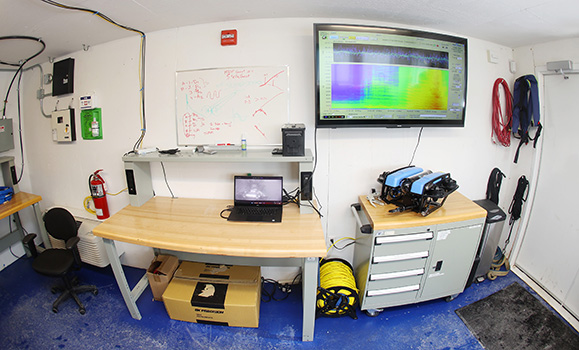
The bigger picture
For some, the link between technology and the ocean may not immediately spring to mind. For others, there's an obvious connection; digital is everywhere and this includes even the darkest depths of the Atlantic Ocean.
In his position, Dr. Whidden will seek to push for further advancements in how AI is used in the ocean sector to support larger societal challenges such as combatting climate change. AI’s potential extends far beyond mere data generation — it’s a facilitator for a ground-breaking change, explains Dr. Whidden.
“For AI, we're in a different place than we were five years ago. In the ocean sector, code was growing, and it was attracting companies, yet the full potential of AI in the ocean remained largely obscured,” he says. “Today, the industry is expanding, and people are realizing the potential of AI but need strong talent to fulfill that potential. In just a few years, the landscape has undergone a remarkable change.”
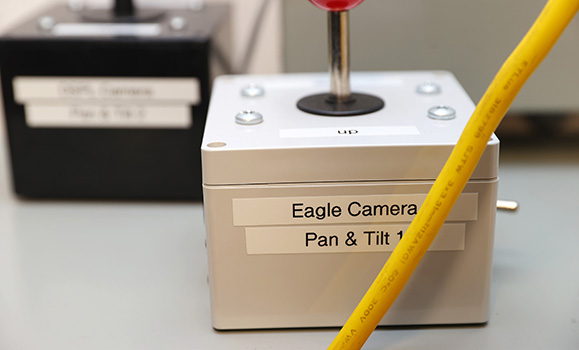
For Dr. Whidden, this appointment means the evolving ocean-tech sector can continue to grow even more. He says he is looking forward to making a strong contribution to it, but he can’t do it alone.
“The big picture here is bringing together different groups such as students, faculty, industry, and universities to fulfil the mutual goal of identifying the next generation of graduates to work in the ocean industry here in Atlantic Canada,” says Dr. Whidden. “It’s bringing all these things together and identifying what skills companies need for the digital ocean and how this aligns with research and our students.”
Dr. Whidden's vision resonates with COVE, DeepSense, and Dalhousie, emphasizing the importance of unity and purpose. Students emerge not only as contributors but as sought-after talents making an impact in the industry.
“It brings me so much joy when we finish a research-based project and the company tells me that they want to hire the student who worked on it,” says Dr. Whidden. “That’s truly the end goal to all of this.”
Recommended reading: Students chart a path to success in Halifax’s booming ocean‑tech sector
Recent News
- Dal‑led initiative aims to help crack the code on gender barriers in tech
- Leading the way: Dal’s 2024 university wide teaching award winners exemplify excellence in higher ed
- Impact Rankings 2024: Dalhousie ranks 65th globally for tackling some of the world's biggest issues
- Dal alumni who are now Canada’s rising business leaders point to common theme for success
- Dalhousie soars into top 18 per cent of universities in QS World University Rankings
- Grad profile: Finding community in the sandbox
- Grad profile: Breaking barriers beyond the classroom
- Shannex invests in healthy aging research at Dal with $2‑million gift
